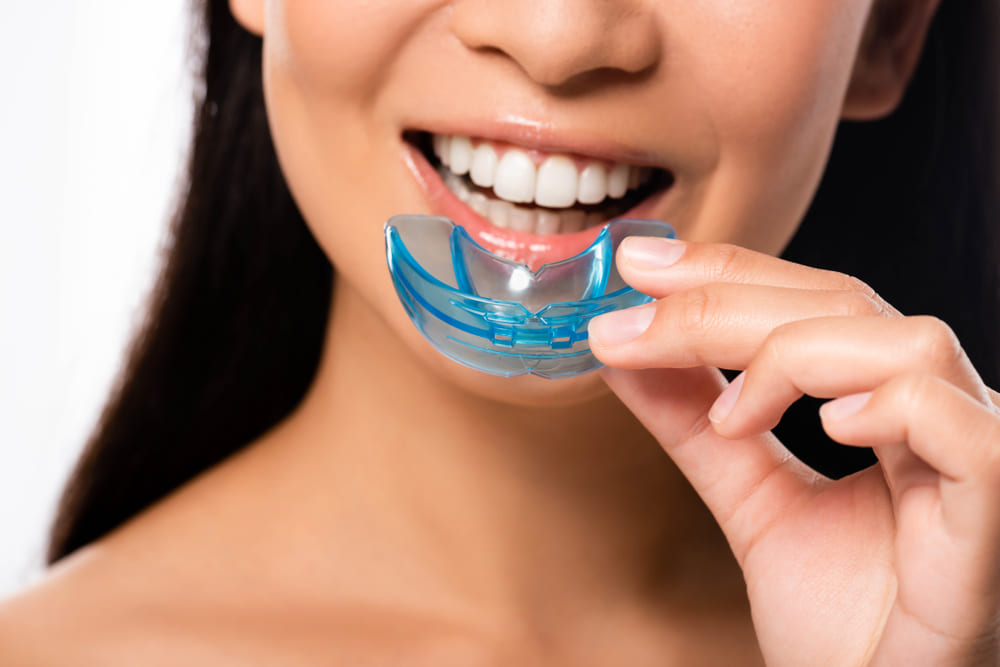A mouthguard is often referred to as a sports guard. It is personalized protective equipment that shields the wearer’s mouth while participating in contact sports. It provides protection by distributing the impact of a collision over a vast surface area. A night guard, on the other hand, prevents teeth from grinding and clenching while sleeping. It is constructed of a robust and thin material.
Protecting your teeth is crucial, whether it’s from the grind of nightly stress or the impact of a powerful blow. Night guards and mouth guards are both essential tools for maintaining oral health, but they serve distinct purposes. In this blog, our dentist in Colwood will delve into the details to unveil the differences between night guards and mouth guards, helping you understand when and why each is necessary.
Night Guards: Preserving Your Teeth While You Sleep
Night guards are specifically designed to address the issue of teeth grinding or clenching during sleep, a condition known as bruxism. This involuntary habit can lead to a range of dental problems, including worn-down enamel, jaw pain, and even headaches from a dentist near you. Night guards act as a protective barrier, preventing the surfaces of your teeth from grinding against each other and absorbing the forces exerted during clenching.
Depending on individual demands, there are several advantages to utilizing a night guard or mouthguard, such as bruxism control during sleep with overnight appliances versus physical impact prevention during athletic activity with sport-specific gear.
Key Characteristics of Night Guards
- Material: Night guards are typically made from softer materials, such as silicone or flexible plastic, to provide a cushioning effect and reduce the impact on teeth.
- Design: They are custom-fit to your teeth, ensuring maximum comfort and effectiveness. Over-the-counter options are also available, but they may not offer the same level of customization.
- Usage: Night guards are worn exclusively during sleep, providing a safeguard against the unconscious habits of teeth grinding and clenching.
Mouth Guards: Shielding Your Teeth during Physical Activity
Mouth guards, on the other hand, are designed to protect your teeth during physical activities where there is a risk of impact or injury to the mouth and jaw. These situations can include sports like football, basketball, or even activities like skateboarding. Mouth dental guards in Colwood act as a shock absorber, reducing the risk of broken teeth, injuries to the lips, tongue, and jaw, and even concussions in some cases.
Key Characteristics of Mouth Guards
- Material: Mouth guards are typically made from durable materials like hard plastic, offering a rigid structure to absorb and disperse impact forces.
- Design: They cover the teeth and gums and may include a lip shield for added protection. Boil-and-bite or custom-fitted options are common, providing a snug fit for optimal protection.
- Usage: Mouth guards are worn during specific activities that pose a risk of oral injury, such as sports, to provide comprehensive protection.
Get a Dental Guard and Protect Your Teeth
Finally, choosing between a night guard and a mouthguard dental guards near you necessitates careful evaluation based on personal needs and preferences. Consult our dentist at Urban Smiles Colwood to determine which one is best for you.
In summary, while night guards and mouth guards might seem similar at first glance, they serve distinct purposes in maintaining oral health. Night guards protect against the consequences of teeth grinding during sleep, while mouth guards provide a shield during physical activities that carry a risk of oral injury. Understanding the differences between these two essential oral health tools will help you make informed decisions about their usage, ensuring the long-term well-being of your teeth and overall oral health.

